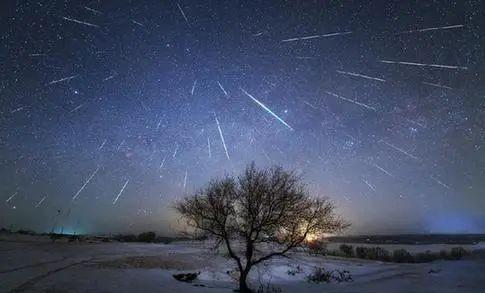Friends who like to watch meteor showers pay attention! This year's grand finale large-scale meteor shower - Gemini meteor shower will usher in a huge december 14, that is, today, the Earth and asteroid fragments together "deduced the plot" will reach a climax, under the most ideal observation conditions, you can see about 150 meteors per hour, an average of two and a half per minute, which is really exciting, coupled with the Gemini meteor shower itself is relatively slow, fire meteors characteristics, quite suitable for public observation and shooting.

Gemini meteor shower in 2020. Source: Xinhua Net
In fact, every year in the middle of December, it is the time when the Gemini meteor shower "returns" to earth, and for nearly half a month before and after, their performances are indispensable in the night sky.
(▲Gemini)
Unlike the Pittometer in January and the Perseid meteor shower in August, the Gemini meteor shower was formed not by fragments of the comet's "exhaust gas", but by dust derived from the asteroid 3200 Faretong. Since the orbit of the Earth happens to intersect with the flight trajectory of the asteroid Faretong, which is about 3 kilometers in diameter, whenever the Earth reaches the location of the orbital intersection, a large amount of planetary debris will collide with the Earth's atmosphere, and various meteors will be formed after friction and combustion.
It's just that December 14 of this year just happened to encounter the full and convex moon, that is, more than half a circle of bright moon, the night sky will be very bright under its illumination, many meteors are covered by its light, until the second half of the moon falls in the "painful" observation, at the same time, today is just a weekday, in addition to high fever level astronomy players, few people will observe all night. None of these factors could stop the performance of the Gemini meteor shower.
Stargazing guide
Whether you are in the city or the countryside, when night falls, you may wish to come to an open field, look up at the stars waiting for the meteor shower, there is a point to pay attention to, especially for the first time to watch the meteor shower friends, the meteor shower is not from a certain point in the sky concentrated out, or is really like rain, countless glowing meteors all cut through the sky, but may come from all directions, "cold" out of the emergence of one or two.
On the night of the 14th, you can avoid the bright moon, that is, look at the night sky behind it, and if you are lucky, you can see shooting stars within a few minutes.
It is worth noting that the grasp of weather information is particularly critical in astronomical observation: on the 14th, affected by cold air, most of the central and eastern parts of China had sunny weather, which was suitable for watching meteor showers. However, the atmospheric diffusion conditions in central and southern China, western Huanghuai, Jianghan and other places are poor, with mild to moderate haze weather; in addition, there is light to moderate snow in parts of the southern Xinjiang Basin and northern Xinjiang, northeastern Inner Mongolia, eastern Jilin and other places, and there is light rain in parts of southeastern Tibet, northwestern Hunan, southeast Chongqing, and north-central Guizhou.
Although the shooting star is beautiful, you must also pay attention to safety and warmth! It is necessary for friends in the north to add an extra pair of pants and coats.
How to shoot a meteor shower? You can use a camera or mobile phone with a wide-angle lens, use a tripod or other tools to fix the device, open the aperture to the maximum, try to improve the sensitivity, and control the exposure time of a single frame in the range of one to a few seconds.
Where to shoot? In principle, this Gemini meteor shower can be seen as long as the weather is good, so choose high and wide places, such as high-rise buildings, mountains, suburbs, seashores, and lakes.
The next few days will be the performance time of the Gemini meteor shower,
Every night there is a chance to see meteors break through the night sky!
Finally, I wish you all success in stargazing!
Source: China Meteorological Administration